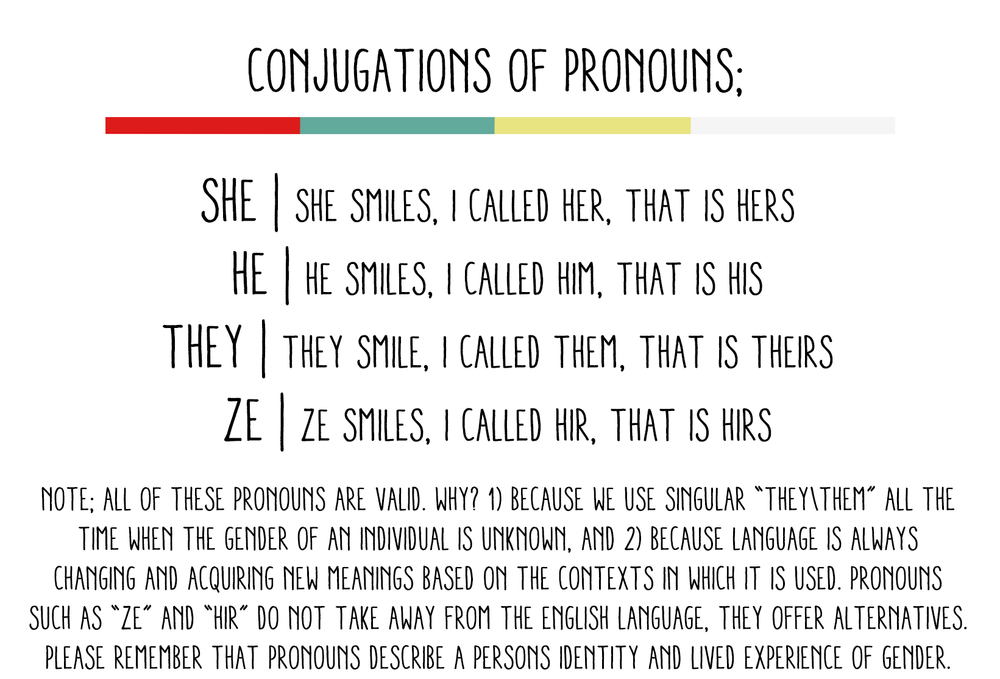Gender Pronouns
In 2017, LSPIRG launched our Gender Pronoun Campaign in both Waterloo and Brantford.
This campaign includes a run down of what gender pronouns are, how to use them, and how you can be in solidarity with trans/non-binary folks. This campaign was created between LSPIRG and the Centre for Student Equity, Diversity and Inclusion with particular support from the Rainbow Centre on the Waterloo campus.
Given the current climate of university campuses - in which increasing levels of transphobia are hidden under a guise of "free speech" and/or grammar - we believe it is essential that we validate the lives of trans/non-binary folks, both on our campuses and in our communities.
What Are Gender Pronouns?
Good question! Gender pronouns are identifiers that we use for people in place of their name (we sometimes also use them to separate into groups, label bathrooms, and decide what color to paint a baby's bedroom). They are usually based on assumptions about a person's gender identity.
For example; "he" and "she" are gender pronouns.
HOWEVER! Not everyone uses these pronouns, so it is important to ask (and to RESPECT) peoples pronouns.
SOME DEFINITIONS;
Cisgender: you are cisgender if you identify with the gender that was assigned to you at birth. E.g. If when you were born, they checked off “female” on your birth certificate, and you currently identify as a woman, then you are a cisgender woman.
Trans/Non-Binary/Gender Fluid: Trans/Non-Binary/Gender Fluid would include folks who are not the gender they were assigned at birth. This encompasses a range of identities and pronouns. These words and labels are limited, and do not come close to encompassing the scope of gender identity and expression.
Unlike most folks, Trans/Non-Binary and Gender Fluid folks often have to ask others to refer to them by their proper pronouns.
How To Use Gender Pronouns
Want to be respectful of someone's pronouns?
ASK: It is important to not make assumptions and asking is the first step!
RESPECT: Use and respect the pronouns you are asked to use. Misgendering is harmful and contributes to everyday transphobia.
CORRECT YOUR MISTAKES: If you make a mistake when referring to someone, correct yourself and move on.
CORRECT OTHERS: As someone with cisgender privilege, you can help by correcting folks who may make a mistake when referring to others.
KNOW THAT PRONOUNS CAN CHANGE: It can be difficult to unpack the gendered expectations we are taught throughout our lives, and so Trans/Non-Binary/Gender Fluid peoples' pronouns may change. Please respect these changes and note that it in no way invalidates their identity or experience.
EDUCATION: Trans/Non-Binary/Gender Fluid people should not be responsible for always educating others about themselves. Try looking for info about gender online or through campus resources such as LSPIRG!
Beyond Pronouns
Using correct pronouns is the first step to acting in solidarity with Tran/Non-Binary and Gender Fluid folks, but we should not stop there! Transphobia is built into laws, institutions, mainstream media, the criminal justice system, social interaction and everyday life! What more can you do to keep folks in your life safe?
Do not assume anything about a person's identity or body (it's not cool to ask someone what's "in their pants", cisgender or not).
If you know someone's old name, don't continue to use it.
Do not out someone without their explicit permission (there are many reasons why someone may not chose to disclose their identity to others).
Respect that Trans/Non-Binary/Gender Fluid folks may not want to disclose things about their families or their childhoods.
Avoid gendering body parts.
LET PEOPLE USE THE BATHROOM IN PEACE!
Allow Trans/Non-Binary/Gender Fluid folks space to discuss their experiences and honour the diversity of those experiences.
Learn about gender without expecting non-cisgender folks to teach you.
Support Trans/Non-Binary/Gender Fluid-led organizations.
Call out transphobia when you see it.
When in doubt, ask folks what they need or how you can support.
Online Resources
The Left Isn't As Trans Friendly As We Think
What is Multi-Gender?

